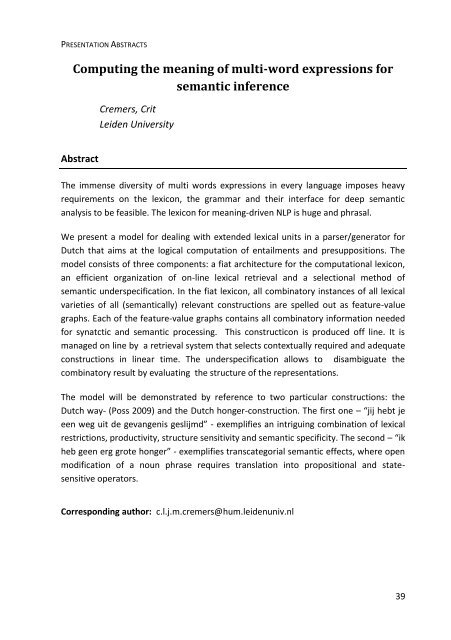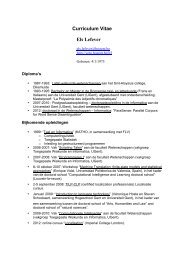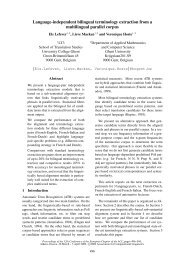Programme booklet (pdf)
Programme booklet (pdf)
Programme booklet (pdf)
Create successful ePaper yourself
Turn your PDF publications into a flip-book with our unique Google optimized e-Paper software.
PRESENTATION ABSTRACTS<br />
Computing the meaning of multi-word expressions for<br />
semantic inference<br />
Abstract<br />
Cremers, Crit<br />
Leiden University<br />
The immense diversity of multi words expressions in every language imposes heavy<br />
requirements on the lexicon, the grammar and their interface for deep semantic<br />
analysis to be feasible. The lexicon for meaning-driven NLP is huge and phrasal.<br />
We present a model for dealing with extended lexical units in a parser/generator for<br />
Dutch that aims at the logical computation of entailments and presuppositions. The<br />
model consists of three components: a fiat architecture for the computational lexicon,<br />
an efficient organization of on-line lexical retrieval and a selectional method of<br />
semantic underspecification. In the fiat lexicon, all combinatory instances of all lexical<br />
varieties of all (semantically) relevant constructions are spelled out as feature-value<br />
graphs. Each of the feature-value graphs contains all combinatory information needed<br />
for synatctic and semantic processing. This constructicon is produced off line. It is<br />
managed on line by a retrieval system that selects contextually required and adequate<br />
constructions in linear time. The underspecification allows to disambiguate the<br />
combinatory result by evaluating the structure of the representations.<br />
The model will be demonstrated by reference to two particular constructions: the<br />
Dutch way- (Poss 2009) and the Dutch honger-construction. The first one – “jij hebt je<br />
een weg uit de gevangenis geslijmd” - exemplifies an intriguing combination of lexical<br />
restrictions, productivity, structure sensitivity and semantic specificity. The second – “ik<br />
heb geen erg grote honger” - exemplifies transcategorial semantic effects, where open<br />
modification of a noun phrase requires translation into propositional and statesensitive<br />
operators.<br />
Corresponding author: c.l.j.m.cremers@hum.leidenuniv.nl<br />
39




